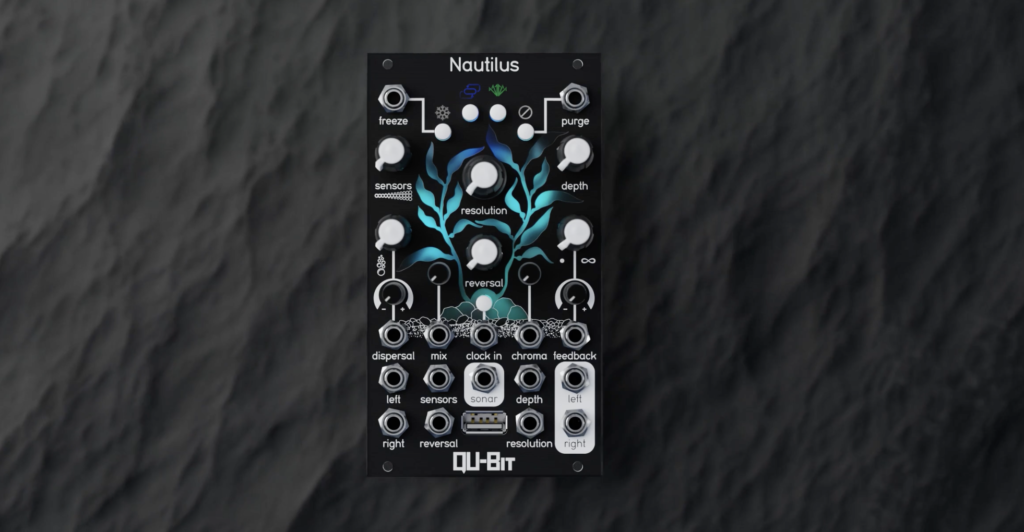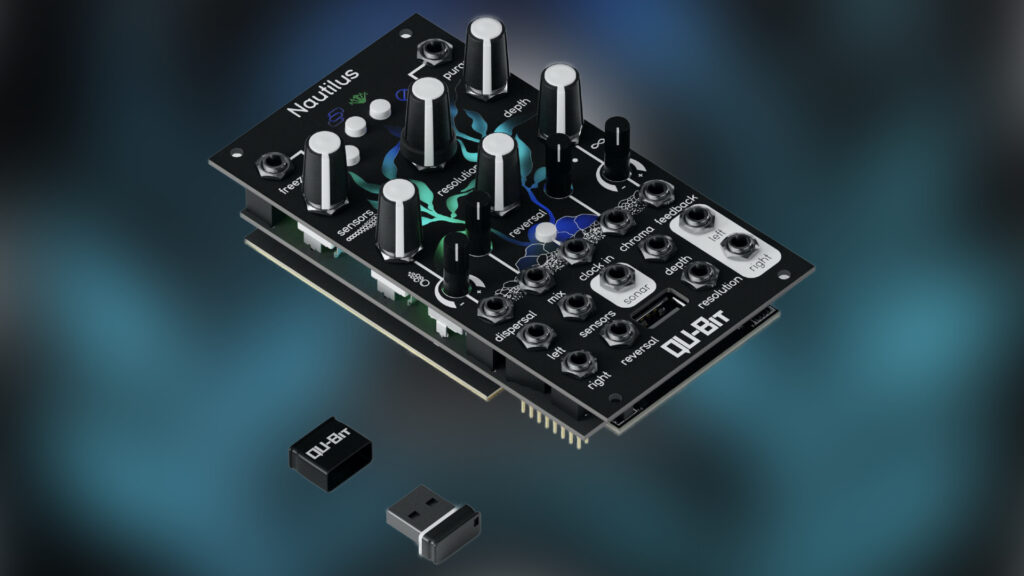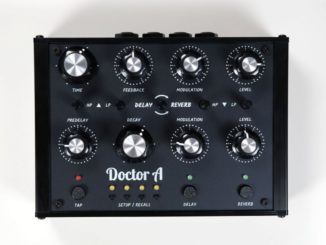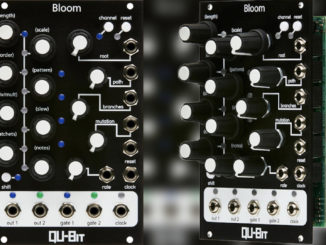Qu-Bit Electronix Nautilus is a new stereo delay module with eight fully customizable delay lines made for deep oceanic sonic explorers.
A little over two years ago, Qu-Bit released Nautilus, a stereo delay module with a very ambient/spheric character. Now, firmware 1.2 is available, which brings new creative features.
Qu-Bit Electronix Nautilus 1.2 now has an onboard end-of-chain lush reverb that is applied to the dry and wet signals. Grab the resolution knob and press the button to increase the reverb mix and decay length.
The stereo delay processor offers a free-running “unclocked” mode that can be activated with another simple button combination. Firmware 1.2 also introduces a new feedback behavior called summed mono mode.
In this new mode, the left and right channels are summed to mono before entering the delay lines. This keeps the dry signal of Nautilus mono and the delay lines stereo. It is a great option to create ping-pong delays. Another handy new function is the option to dim the LEDs of the module.
Other new features are available exclusively through Qu-Bit’s Narwhal app: new mix cure options, continuous purge for the delay, swappable reverb presets with different dampening characteristics (normal, bright, dark), and the ability to customize the LED colors.
The new Qu-Bit Electronix Nautilus 1.2.0 update is available now as a free download.
Article From September 27, 2024
US-based Eurorack company Qu-Bit Electronix loves digital modules and developing innovative algorithms. Their modules are packed with interesting functions covering a huge sound spectrum.
In addition, the current ones are also open-source, allowing other developers to design alternative firmware versions. After the Aurora reverb, there is now a stereo delay called Nautilus, which allows you to discover the fascinating oceanic worlds.
Inspired by the ocean and oceanic exploration, Nautilus’ name is directly derived from the fictional submarine in iconic French writer Jules Verne’s timeless classic science fiction novel Twenty Thousand Leagues Under the Sea, so — much like said novel’s Captain Nemo
Qu-Bit Electronix Nautilus
Nautilus is a powerful digital stereo delay consisting of eight unique delay lines with unique explorative connection and synchronization options. According to Qu-Bit, it’s inspired by sub-nautical communications and their interaction with the environment.
The core features of the Nautilus are quite traditional. It includes an internal clock that offers tap tempo and external clock options, complete with controls for resolution (division/multiplication) and a feedback parameter that adjusts the number of repeats. Additionally, all these features are controllable via CV.
Qu-Bit Electronix says that Nautilus’ ambition lies in exploration, in discovering how sound travels and interacts within the aquatic world. To this end, they have designed an engine that goes far beyond what a classic stereo delay can do.
More precisely, the module gives you the option not only to manipulate the entire delay effect but also independent delay lines.
There are eight co-dependent delay lines – four per stereo channel occurring simultaneously with up to 20 seconds of audio each, and tempo-synced control over the spacing between the delays. Nautilus hosts sensors and dispersal functions that take your delay lines into unique, complex delayscapes. Basically, each delay line is itself a single delay within the network with different manipulation options (reverse…)
Effected Delay Lines
To give the user even more options to make the delays sound like they are from the deep ocean, there is a unique effect section aka chromatic and depth receptors. They made for “emulating the varying aquatic materials and terrain that Neuilus’ sonar passes through with digital interferences and more.
You can choose between different filters (lowpass, highpass), distortion, and coloring effects, including a customizable bitcrusher, saturator, or for more wild explorations a built-in wavefolder. Each effect can be independently applied to the delay lines. This allows you to create multi-layer of effect delay lines with either full control through the interface or CV.
Then, Nautilus benefits from a rich amount of stereo feedback characteristics, including ping-pong style delay, cascading delays, Adrift, doppler delays, pitch-shift, shimmer, faded delays, and more. Lots to explore. There is also a neat freezing function for the delay lines.
More Is More
In addition to the absurd number of ways to manipulate the delay lines, you can also use Nautilus as a modulation source using the pings from the delay network or the generated topography. Further, it has two fully customizable attenuverters that are either useable as attenuverters or as controls for other functions. Via the USB port, you can configure these freely.
Plus, the sonar output creates another algorithmic-generated CV or gate signal. That can be envelope followers, triggers, additive modulation, and more. As icing on the cake, the module is open-source and, therefore, completely customizable. That means you can also add new functions or create entirely new firmware versions.
The beautifully designed user interface offers intuitive and full control. With six control knobs, four buttons, 4 CV potentiometers, buttons, and many inputs/outputs.
First Impression
At first glance, this looks like a huge stereo delay module. I’m curious how easy it is to use. The first sound demos are available on the Qu-Bit website, and they sound very promising. So, off into the deep ocean, and let’s look for the sound of Nemo, right?
Qu-Bit Electronix will be available on October 6, 2022, and is ready for pre-order. Its MSRP is $399 USD. With each Nautilus purchase, Qu-Bit will donate a portion of the proceeds to the Surfrider Foundation for ocean and coastal conservation.
More information here: Qu-Bit Electronix
Available at my partner






Has anyone ever created a reverb that is not “lush”? 🙂
classic reverbs like room, hall.. are for me less lush 😉